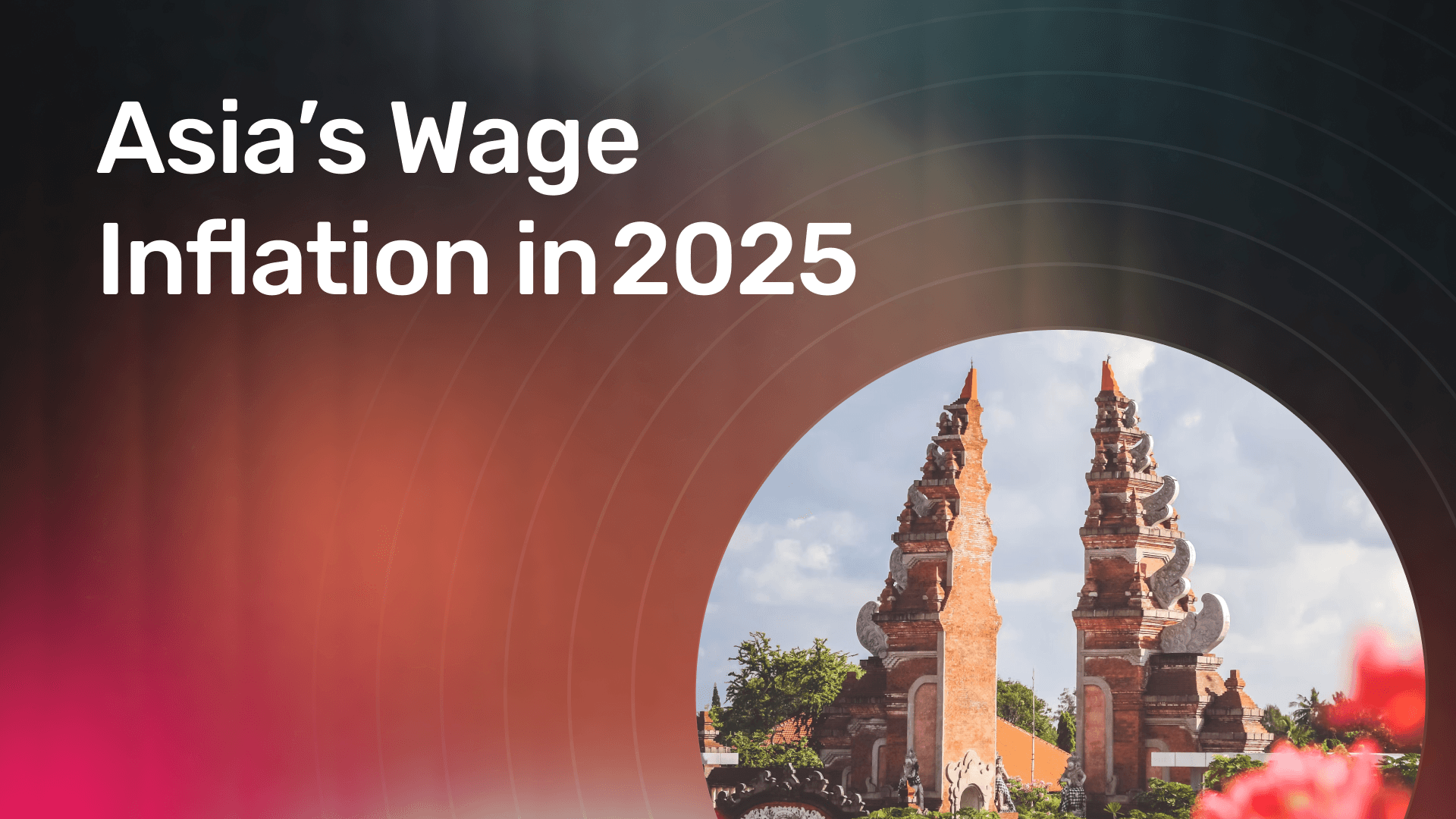Asia’s Wage Inflation in 2025: How Indian Startups Can Still Hire Top Tech Talent - Legally
For many years, Indian companies have been able to rely on getting affordable talent at home, with only a limited need to look abroad. But 2025 is a turning point. According to WTW’s latest Salary Budget Planning Report, the median salary increase in India is forecasted to rise by 9.5% in 2025, matching the actual 9.5% increase recorded in 2024.
Countries such as Vietnam, Indonesia, the Philippines, and Singapore are all seeing steady wage inflation. For Indian startups, this means they are being squeezed from both sides: rising salary expectations at home and shrinking cost advantages abroad.
At the same time, hiring across borders has never been easier in terms of connectivity and collaboration tools. Startups can tap developers, data engineers, and AI specialists anywhere. But it is not as simple as signing a contract and wiring money. Compliance matters. Misclassification, unpaid benefits, or breaches of labour law can all backfire badly.
This is where an Employer of Record (EOR) comes in, offering startups a way to hire top tech talent legally, affordably, and with complete peace of mind.

Asia’s wage inflation snapshot for 2025
Before getting into the opportunities of cross-border hiring, it’s important to look at what’s happening on the ground. Across Asia, wages are climbing steadily, putting pressure on businesses to rethink their hiring strategies. Here’s a closer look at four key markets:
Vietnam
Vietnam continues to be one of Asia’s fastest-growing economies, with GDP expected to expand by around 7.5% in 2025. Record levels of foreign direct investment, particularly in technology, electronics, and manufacturing, are driving demand for skilled professionals.
- Average wages are projected to rise 6.7% overall this year.
- Tech and engineering roles face even sharper inflation, at up to 7.5%.
- Minimum wages will rise 5.7% from mid-2025, adding further upward pressure.
For startups looking to hire developers, Vietnam remains attractive thanks to its large pool of technically skilled graduates. However, those cost advantages are narrowing as multinationals compete aggressively for local talent.
Indonesia
Indonesia, Southeast Asia’s largest economy, is also seeing rising labour costs.
- Salaries are forecast to grow by 6.3% on average in 2025, one of the steepest increases in the region.
- Provincial minimum wage hikes of 6–6.5% introduced in late 2024 will continue to ripple through 2025.
- Software development, fintech, and digital services are under the greatest pressure, with employers competing for a limited number of mid to senior-level engineers.
For Indian startups, Indonesia offers both scale and skills. But compliance challenges, particularly with local tax and social insurance requirements, make direct hiring risky without local expertise.

Philippines
The Philippines has long been a popular outsourcing destination due to its English fluency and cultural alignment with Western clients. But rising demand for tech skills is pushing salaries up.
- Wage growth of 5.8% is expected in 2025.
- The technology and manufacturing sectors are leading the increase.
- Statutory contributions to SSS (Social Security System), PhilHealth, and Pag-IBIG further add to employer costs.
For startups, the Philippines remains an excellent location for customer support and software development teams. However, compliance with statutory benefits is non-negotiable—failure to pay can lead to fines and reputational harm.
Singapore
Singapore stands out as both a premium and stable market.
- Salaries will increase by around 4.4% overall and 3.3% in tech roles.
- The base level of salaries is already much higher than in neighbouring countries.
- Many employers remain cautious, with fewer than a quarter planning significant pay rises beyond March 2025.
While Singapore may not be the cheapest option, it offers world-class talent and a robust business environment. For startups looking for leadership roles or niche specialists, Singapore is still a valuable hub, though rarely a cost-saving one.
Why remote talent is tempting, and risky
The appeal of hiring abroad is obvious: lower costs, wider talent pools, and flexible team structures. However, what looks like a shortcut to growth can quickly turn into a compliance headache if not handled properly. Let’s understand both sides of the equation.
- Cost-effectiveness: Even with wage inflation in 2025, Vietnam, Indonesia, and the Philippines still offer better wage-to-skill ratios compared to Western markets. For example, a mid-level software engineer in Ho Chi Minh City or Manila often costs 30–50% less than a comparable role in Europe or the US.
- Skilled workforce: These countries are investing heavily in education. Vietnam alone produces over 50,000 IT graduates every year, while the Philippines and Indonesia have strong pools of developers, designers, and support staff. Many have worked with international companies before, which makes them quick to adapt to global business standards.
- English proficiency: The Philippines, in particular, stands out for English skills, ranking high in global proficiency indexes. This makes communication smooth, especially for customer-facing or collaborative roles.
- Time-zone compatibility: With most of Southeast Asia’s time zones ranging between UTC+5.5 and UTC+8, there’s a strong overlap with India. This allows for real-time communication during core working hours without stretching teams too thin.
- International outlook: Many professionals in these countries have already worked with global firms, giving them exposure to Western standards of project management, tools, and workflows.
But while the upside is obvious, the risks can be just as large if hiring is not done properly. Too many startups fall into the trap of treating full-time overseas workers as “independent contractors” instead of employees. This may save money on paper, but it creates a dangerous compliance gap.
If a contractor:
- Works fixed schedules set by your company
- Reports directly to your managers
- Uses company laptops, tools, or systems
- Depends on your business as their primary or only source of income
…then local labour authorities may reclassify them as employees, regardless of what the contract says.
The consequences can be serious:
- Back payments: Employers may be forced to pay years of unpaid social security contributions, taxes, and benefits.
- Fines and penalties: As seen in countries like Vietnam and Singapore, penalties can run into tens of thousands of dollars, alongside possible legal action.
- Reputation risks: Non-compliance can damage relationships with local regulators, make it harder to expand, and raise red flags with investors or potential partners.

Compliance risks & penalties
Hiring overseas talent isn’t just about finding the right skills; it’s also about playing by the rules. Each country has its own laws on taxes, social security, and employee benefits. If businesses take illegal shortcuts, the penalties can be severe. Here’s what startups need to know.
- Vietnam: In Vietnam, companies that misclassify employees or skip social insurance contributions face fines ranging from VND 12 million to 75 million (approx. USD 470 – 2,950). Beyond fines, businesses may also be forced to repay up to 12 months of unpaid insurance contributions plus interest, making non-compliance far more expensive than doing things correctly from the start.
- Indonesia: Specific penalties for misclassification or non-payment aren't always publicly accessible in accessible sources. However, authorities regularly conduct audits and enforce back pay with interest, fines, and reputational consequences. It's generally understood that failure to pay statutory contributions can result in significant penalties and audits.
- Philippines: Non-compliance with employee benefits in the Philippines, like the SSS, PhilHealth, and Pag-IBIG obligations, comes with both financial penalties and possible jail time for company officers.
- Social Security System (SSS): Late payments attract a 2% monthly penalty (compounded). Criminal fines range from ₱5,000–₱20,000, plus possible imprisonment of 6 to 12 years. Authorities may also issue asset seizures (warrants of distraint) to recover dues.
- PhilHealth: Unpaid contributions incur at least 3% interest per month. Criminal fines are ₱5,000–₱10,000 per affected employee, with imprisonment of 6 months to 6 years.
- Pag-IBIG Fund: Charges around 0.1% daily interest (≈3% per month) on unpaid amounts, plus a ₱200 processing fee. Criminal fines can reach ₱20,000, with imprisonment of up to 6 years, depending on the offence.
- On top of fines and jail terms, enforcement can include garnishment of company assets, suspension of business permits, and personal liability for directors and officers.
- Singapore: In Singapore, misclassifying workers, intentionally or otherwise, can have serious legal and financial consequences for businesses, such as:
- Fines of up to SGD 5,000 for missing tax filing or clearance duties.
- In cases of tax evasion or fraud, up to 400% of the underpaid tax, fines of up to SGD 50,000, and even five years’ imprisonment.
- For tax avoidance, a 50% surcharge on the tax adjustment may apply, though it can be reduced if there’s a valid reason.
- Failing to pay into the Central Provident Fund (CPF) can lead to fines between SGD 1,000 and 5,000 or six months in prison for first-time offences. Repeat cases may face fines up to SGD 10,000 and 12 months in prison.
In short, cutting corners is risky, and penalties often outweigh any cost savings.

EOR - The legally compliant shortcut
An Employer of Record (EOR) provides startups with a practical solution. Acting as the legal employer in the worker’s country, the EOR handles all compliance, leaving the startup free to focus on managing work output and business growth.
What an EOR covers
Before choosing an EOR, it helps to know exactly what they take off your plate. Here’s what they typically handle:
- Employment contracts: Drafting legally compliant contracts tailored to the country’s labour laws.
- Payroll management: Processing salaries in local currencies while adhering to tax regulations.
- Statutory contributions & benefits: Handling social security, healthcare, insurance, pensions, and other mandatory benefits.
- Employment classification: Preventing misclassification issues that could result in fines or legal disputes.
- Documentation & compliance: Maintaining audit-ready records to satisfy regulators and investors.
- Employee support: In some cases, EORs like Native Teams also help with onboarding, HR queries, and ongoing employee relations.
Why it matters for Indian startups
At this point, the question is not whether to use an EOR, but why it makes such a difference for Indian startups. Here are some reasons:
- No local entity required: Avoids months of paperwork and large upfront investments.
- Faster hiring cycles: Onboard new hires within weeks instead of waiting months for legal setup.
- Scalable growth: Enter multiple markets simultaneously without navigating different legal systems.
- Risk reduction: Stay compliant with local employment laws, avoiding penalties, lawsuits, or reputational damage.
- Investor confidence: Startups that use compliant hiring models look more attractive to VCs, as legal risks are minimised.
- Cost efficiency: Compared to setting up subsidiaries or facing compliance penalties, EORs offer a leaner, safer model.

Final thoughts
Hiring in Asia is changing fast. Salaries are going up, rules are getting tighter, and the old “cheap labour” idea doesn’t really fit anymore. But that’s not a bad thing.
What it really means is that the region is full of skilled people who are ready to do great work. The challenge is making sure you hire them in the right way, without tripping over legal or compliance issues.
That’s where an Employer of Record (EOR) comes in. Think of it as your local partner who takes care of the boring but important stuff like contracts, payroll, and compliance, so you can grow your business while staying on the safe side of local laws.
Instead of worrying about rising costs, consider the opportunity: Asia is still one of the best places to find great teams and grow quickly, if you do it smart.
